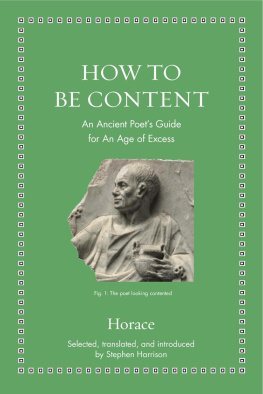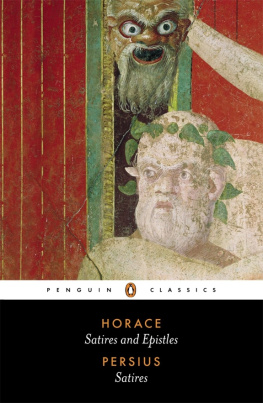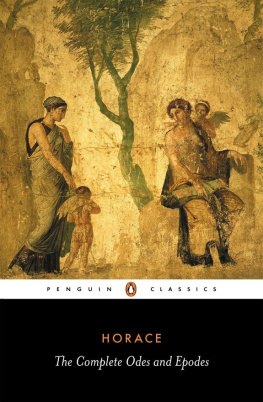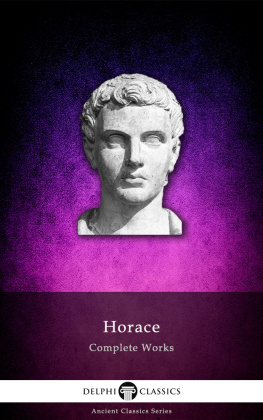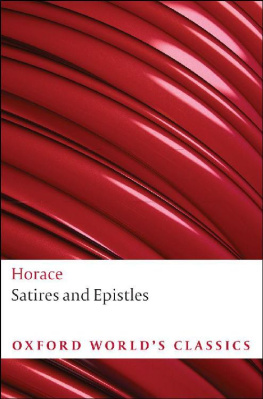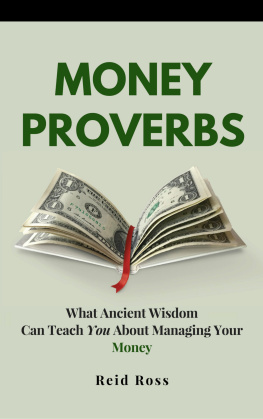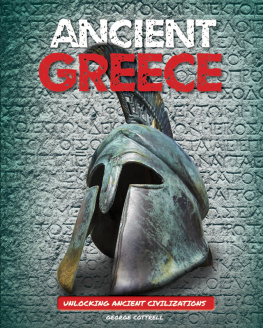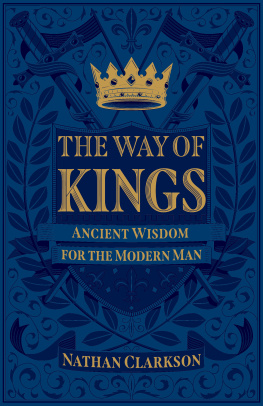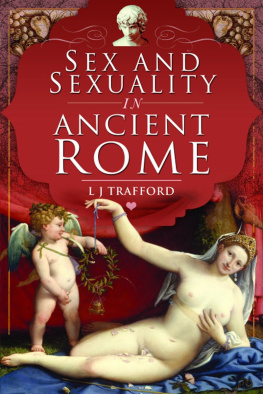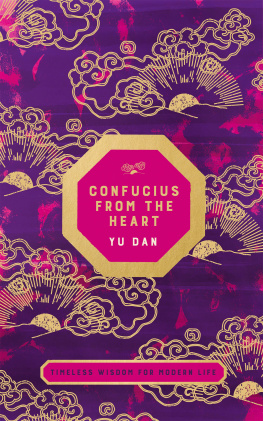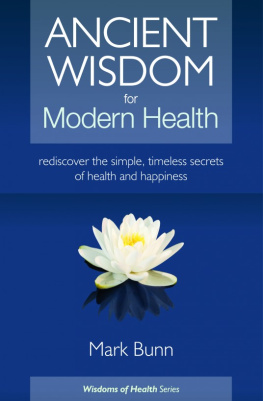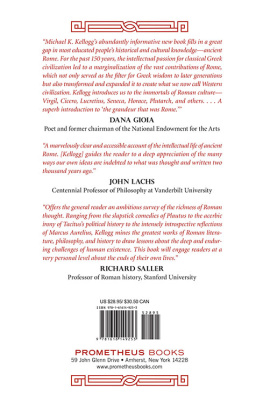
HOW TO BE CONTENT
ANCIENT WISDOM FOR MODERN READERS

For a full list of titles in the series, go to https://press.princeton.edu/series/ancient-wisdom-for-modern-readers
How to Be Content: An Ancient Poets Guide for an Age of Excess by Horace
How to Give: An Ancient Guide to Giving and Receiving by Seneca
How to Drink: A Classical Guide to the Art of Imbibing by Vincent Obsopoeus
How to Be a Bad Emperor: An Ancient Guide to Truly Terrible Leaders by Suetonius
How to Be a Leader: An Ancient Guide to Wise Leadership by Plutarch
How to Think about God: An Ancient Guide for Believers and Nonbelievers by Marcus Tullius Cicero
How to Keep Your Cool: An Ancient Guide to Anger Management by Seneca
How to Think about War: An Ancient Guide to Foreign Policy by Thucydides
How to Be Free: An Ancient Guide to the Stoic Life by Epictetus
How to Be a Friend: An Ancient Guide to True Friendship by Marcus Tullius Cicero
HOW TO BE
CONTENT

An Ancient Poets Guide
for an Age of Excess
Horace
Selected, translated and introduced
by Stephen Harrison
PRINCETON UNIVERSITY PRESS
PRINCETON AND OXFORD
Copyright 2020 by Princeton University Press
Requests for permission to reproduce material from this work should be sent to permissions@press.princeton.edu
Published by Princeton University Press
41 William Street, Princeton, New Jersey 08540
6 Oxford Street, Woodstock, Oxfordshire OX 20 1 TR
press.princeton.edu
All Rights Reserved
ISBN 978-0-691-18252-0
ISBN (e-book) 978-0-691-20849-7
British Library Cataloging-in-Publication Data is available
Editorial: Rob Tempio and Matt Rohal
Production Editorial: Jenny Wolkowicki
Text and jacket design: Pamela Schnitter
Jacket art: Relief of a banqueter, Roman, late Republican period, ca. 50 BC.
Photograph 2020, Museum of Fine Arts, Boston
I N M EMORIAM
Jasper Griffin (19372019)
Donald Russell (19202020)
CONTENTS
PREFACE AND
ACKNOWLEDGEMENTS
As in other books in the Ancient Wisdom for Modern Readers series, the original Latin is included in addition to the translation. Unlike in most other books in the series, however, it is not on facing pages but forms part of the main text. It can be skipped by those who dont read Latin.
My warm thanks go to Al Bertrand at PUP who started this project rolling, Hannah Paul who commissioned it, and Rob Tempio who saw it to completion. I am most grateful to them for an opportunity to bring a great poet to a wider audience.
I am especially grateful to my friend Maureen Almond, who has read and commented on the whole volume with the eye of a poet and fellow Horatian enthusiast, and to the two anonymous reviewers for PUP, who made salutary suggestions. I would also like to thank Jenny Wolkowicki and Maia Vaswani at PUP for their help in the final stages.
While this book was in press, two of my early teachers and advisers died; my former tutor Jasper Griffin and my post-doctoral mentor Donald Russell, both of whom wrote illuminatingly about Horace and had his generosity of spirit; I dedicate this volume jointly to their memory.
HOW TO BE CONTENT
INTRODUCTION
A readers preferences and sympathies change with time and circumstances; we react most intensely to the works and writers who suit our own current situation and concerns. As I move through middle age, Horace appeals more and more to me amongst the great poets of ancient Rome for his measured and mature moral advice as well as for his marvellous musicality and technical skill. I very much welcome this opportunity to bring Horaces real and practical wisdom (and my own enthusiasm for this great poet) to a wider audience. When I talk of Horace in this volume, I generally mean the figure of the poet-author found in the poems transmitted under the name of Quintus Horatius Flaccus; it is difficult indeed to access the actual thought processes of the historical individual.

But this is a poet for whom the known facts of his life are important in understanding his work. We possess a short Latin biography of him, which may go back to one by Suetonius, author of the well-known biographies of the twelve Caesars at the end of the first century CE. This and his poems constitute the key sources for the basic data about Horace, though the first-person statements we find in his work (superficially candid and plausible) are always carefully managed, often hard to pin down, and sometimes misleading, and we must always be cautious in accepting them at face value.
We can be fairly sure of his day of birth (8 December 65 BCE; for confirmation of the month see Epistles 1.10.27), his birthplace (Venusia, modern Venosa, on the border of ancient Apulia and Lucania in southeastern ItalySatires 2.1.3435), and his date of death (27 November 8 BCE). His father worked as a successful auctioneer and financial agent, and seems at an early age to have been temporarily enslaved following capture in the Social War (9188 BCE), in which Italian communities fought against Rome for citizen rights. This gave Horace the low and dubious status of a freedmans son (libertino patre natusSatires 1.6.3), but his father had enough money and ambition to send his son to the prestigious school of Orbilius at Rome (Satires 1.6.7678, Epistles 2.1.71) and later to Athens for university-style study with the sons of the Roman elite (Epistles 2.2.4345).
It was there in 43 BCE that the young Horace attached himself to the cause of Marcus Brutus, who was also in Athens after his assassination of Julius Caesar the previous year, and went with him on campaign in Greece, serving as tribunus militum, military tribune (Satires 1.6.48), a rank for young elite members. In the autumn of 42 BCE he was on the losing side in the crushing defeat of Brutus at Philippi at the hands of Mark Antony and the young Caesar, the future Augustus (a bloody battle ironically depicted in Odes 2.7), but escaped and returned to Rome.
Horace himself claims that he lost his fathers estate, perhaps in the land confiscations of 4140 BCE, and turned to poetry to make money (Epistles 2.2.4952); but he seems to have had enough funds in this period to purchase the post of scriba quaestorius, clerk to the quaestor, a significant administrative position, which he retained at least to the end of the 30s BCE (Satires 2.6.3637). By that time Horace was certainly of equestrian status (Satires 2.7.53); that is, substantially wealthy.

This was no doubt because in the early 30s BCE he became attached to the circle of writers around Augustuss important adviser Maecenas, introduced by no less than his fellow poet Vergil (Satires 2.6.4042, 1.6.5556); at some point in the 30s he received from Maecenas the gift of a substantial Sabine estate, in a beautiful and peaceful valley location about thirty miles from the centre of Rome, which contained several subordinate farms as well as a villa (Satires 2.6). The remains of this villa may well be under the later grand building close to Licenza near the modern Tivoli, which has been much investigated in recent years. In
Next page
